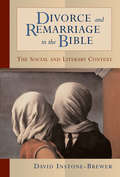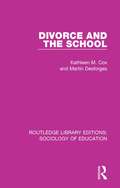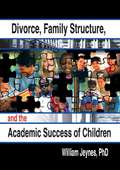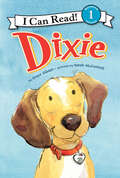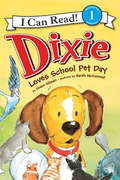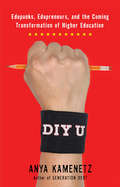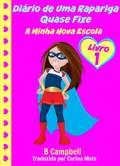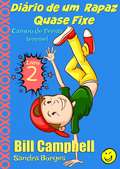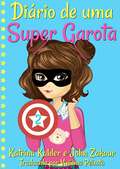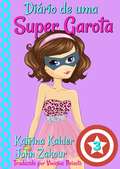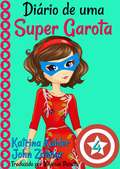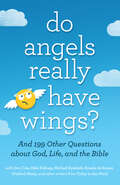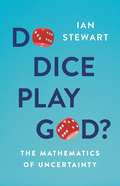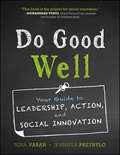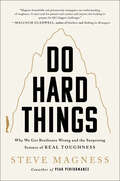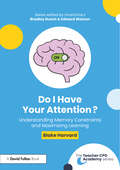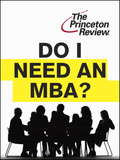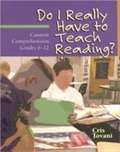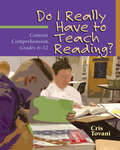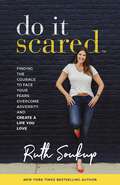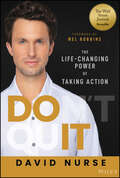- Table View
- List View
Divorce and Remarriage in the Bible: The Social and Literary Context
by David Instone-BrewerTo many, the New Testament's teaching on divorce and remarriage seems to be both impractical and unfair. The "plain" meaning of the texts allows for divorce only in cases of adultery or desertion, and it does not permit remarriage until the death of one's former spouse. But are these proscriptions the final word for Christians today? Are we correctly reading the scriptures that address these issues?By looking closely at the biblical texts on divorce and remarriage in light of the first-century Jewish and Greco-Roman world, this book shows that the original audience of the New Testament heard these teachings differently. Through a careful exploration of the background literature of the Old Testament, the ancient Near East, and especially ancient Judaism, David Instone-Brewer constructs a biblical view of divorce and remarriage that is wider in scope than present-day readings.Among the important findings of the book are that both Jesus and Paul condemned divorce without valid grounds and discouraged divorce even for valid grounds; that both Jesus and Paul affirmed the Old Testament grounds for divorce; that the Old Testament allowed divorce for adultery and for neglect or abuse; and that both Jesus and Paul condemned remarriage after an invalid divorce but not after a valid divorce. Instone-Brewer shows that these principles are not only different from the traditional church interpretation of the New Testament but also directly relevant to modern relationships.Enhanced with pastoral advice on how to apply the biblical teaching in today's context, this volume will be a valuable resource for anyone seeking serious answers about married life.
Divorce and the School (Routledge Library Editions: Sociology of Education #15)
by Martin Desforges Kathleen M. CoxThis practical and accessible book, first published in 1987, provides examples of ways in which schools can ease children through the stress caused by changes in family structure. Through case histories the authors illustrate the sorts of problems likely to produce stress for children during divorce. In the following chapters they deal with the stages of marital breakdown; children’s reactions to parental separation related to age; the law and legal processes associated with divorce; the role of the school and its organisation in helping children under stress, and the relevance of curriculum content for such children. This title will be of interest to teachers and students of education and sociology.
Divorce, Family Structure, and the Academic Success of Children
by William JeynesTrace the influence of family factors on children's emotional and educational well-being!The effect of family changes on children's academic success is a new subject for study. Divorce, Family Structure, and the Academic Success of Children is a comprehensive volume that brings research on this hotly debated topic up to date. With clear tables and incisive arguments, it is a single-volume reference on this vexing sociocultural problem. Divorce, Family Structure, and the Academic Success of Children offers a close look at the historical background and current theory of this field of study. But it is more than a compendium of known facts and completed studies. It examines issues of appropriate methodology and points out concerns for planning future research. Divorce, Family Structure, and the Academic Success of Children summarizes current knowledge of the effects of various influences on children's emotional and educational well-being, including: divorce and remarriage single-parent families nontraditional family structures race socioeconomic status mobility Educators, theorists, sociologists, and psychologists will find this volume an essential resource. With hundreds of useful references and clear organization, it presents new ideas in an easy-to-use format that makes it an ideal textbook as well.
Divyangajanon ke Sashaktikaran ke liye Padadhikariyon evan Gairasarakari Sangathanon Hetu Marganirdeshika-competitive exams
by Rajya Nihshaktata Aayukta Karyalay Jharkhand Sarkarराज्य निःशक्तता आयुक्त कार्यालय (महिला, बाल विकास एवं सामाजिक सुरक्षा विभाग, झारखण्ड सरकार) के द्वारा दिव्यांगजनों, स्वयंसेवी संस्थाओं एवं पदाधिकारियों को जागरूक करने के उद्देश्य से "दिव्यांगजनों के सशक्तिकरण के लिए पदाधिकारियों एवं गैरसरकारी संगठनों हेतु मार्गनिर्देशिका' प्रकाशित किया जा रहा है। दिव्यांगों में प्रतिभा की कमी नहीं है। दिव्यांगों ने विभिन्न क्षेत्रों में अपनी प्रतिभा को प्रदर्शित करते हुए राष्ट्रीय ही नहीं, अन्तर्राष्ट्रीय स्तर पर भी ख्याति अर्जित की है। दिव्यांगजनों के विकास हेतु सरकार द्वारा कई कल्याणकारी योजनायें संचालित है। इन योजनाओं के सफल कार्यान्वयन हेतु सबकी भागीदारी आवश्यक है ताकि योजनाओं के प्रति सभी जागरूक हो सके और दिव्यांगों को इसका समुचित लाभ प्राप्त हो सके। आशा है कि राज्य निःशक्तता आयुक्त कार्यालय के द्वारा प्रकाशित की जानेवाली मार्गनिर्देशिका दिव्यांगजनों के सशक्तिकरण हेतु के लिए उपयोगी सिद्ध होगी।
Divyangjanon Ke Liye Rozgar Kaushal: दिव्यांगजनों के लिए रोजगार कौशल
by Skill India and Skill Council for Persons with Disability“दिव्यांगजनों के लिए रोजगार कौशल” पुस्तक दिव्यांग व्यक्तियों (PwDs) के लिए रोजगार और आजीविका कौशल विकसित करने हेतु एक व्यापक मार्गदर्शिका है। यह पुस्तक विशेष रूप से लोकोमोटर दिव्यांगता, दृष्टिबाधित, श्रवण बाधित और अन्य दिव्यांगता वाले व्यक्तियों को ध्यान में रखकर तैयार की गई है। 70 घंटे के इस प्रशिक्षण पाठ्यक्रम में आत्मनिर्भरता, आत्मविश्वास निर्माण, और रोजगारपरक कौशल पर जोर दिया गया है। इसमें आत्म-जागरूकता, प्रभावी संचार कौशल, साक्षात्कार की तैयारी, रिज़्यूमे लेखन, और समय प्रबंधन जैसे व्यावसायिक कौशल शामिल हैं। साथ ही, डिजिटल साक्षरता के तहत कंप्यूटर का उपयोग, ईमेल संचालन और ऑनलाइन संसाधनों तक पहुंच के तरीकों को भी सिखाया गया है। पुस्तक में स्वरोजगार और उद्यमिता को बढ़ावा देने के लिए रोजगार के विविध विकल्पों और व्यावसायिक योजनाओं की जानकारी दी गई है। सरल भाषा, चित्रों, और व्यावहारिक गतिविधियों के माध्यम से इसे सभी के लिए सुलभ बनाया गया है। यह केवल एक प्रशिक्षण पाठ्यक्रम नहीं, बल्कि दिव्यांगजनों के सशक्तिकरण और आत्मनिर्भरता की दिशा में एक महत्वपूर्ण पहल है। Skill India और SCPwD (Skill Council for Persons with Disability) जैसे प्रतिष्ठित संगठनों के सहयोग से विकसित, यह पुस्तक न केवल दिव्यांगजनों के लिए उपयोगी है, बल्कि प्रशिक्षकों और मार्गदर्शकों के लिए भी एक अनूठा संसाधन है। इसका उद्देश्य दिव्यांगजनों को उनके कौशल और क्षमताओं का अधिकतम उपयोग करने के लिए प्रेरित करना है, जिससे वे रोजगार के अवसरों को प्राप्त कर सकें और समाज में सम्मानजनक जीवन व्यतीत कर सकें। आत्मनिर्भरता और सशक्तिकरण पर केंद्रित यह पुस्तक दिव्यांगजनों के जीवन को सकारात्मक रूप से बदलने की दिशा में एक प्रभावी प्रयास है।
Dixie (I Can Read Level 1)
by Grace GilmanEmma needs to prepare for her class's production of The Wizard of Oz, so she can't play with her puppy, Dixie, after school. But Dixie does not understand. Features read-to-me audio, perfect for sharing.
Dixie Loves School Pet Day (I Can Read Level 1)
by Grace GilmanWhen Dixie gets to join Emma at school for Pet Day, she can hardly stop wagging her tail with excitement! Emma's classmates have all kinds of pets--hamsters, birds, goldfish--even lizards! Dixie tries her best to sit still, but with all the new friends to make, she may not be able to stay calm for long . . . Dixie's loveable antics will keep beginning readers laughing in this wonderful addition to the I Can Read library.
Diy U
by Anya KamenetzThe price of college tuition has increased more than any other major good or service for the last twenty years. Nine out of ten American high school seniors aspire to go to college, yet the United States has fallen from world leader to only the tenth most educated nation. Almost half of college students don't graduate; those who do have unprecedented levels of federal and private student loan debt, which constitutes a credit bubble similar to the mortgage crisis. The system particularly fails the first-generation, the low-income, and students of color who predominate in coming generations. What we need to know is changing more quickly than ever, and a rising tide of information threatens to swamp knowledge and wisdom. America cannot regain its economic and cultural leadership with an increasingly ignorant population. Our choice is clear: Radically change the way higher education is delivered, or resign ourselves to never having enough of it. The roots of the words "university" and "college" both mean community. In the age of constant connectedness and social media, it's time for the monolithic, millennium-old, ivy-covered walls to undergo a phase change into something much lighter, more permeable, and fluid. The future lies in personal learning networks and paths, learning that blends experiential and digital approaches, and free and open-source educational models. Increasingly, you will decide what, when, where, and with whom you want to learn, and you will learn by doing. The university is the cathedral of modernity and rationality, and with our whole civilization in crisis, we are poised on the brink of Reformation.
Diário de Uma Rapariga Quase Fixe
by Bill Campbell Carina MotaUma nova escola… um novo começo. Bem, pelo menos é o que a Madonna espera. Ela é uma rapariga “normal”, bem, mais ou menos. Não está no grupo dos populares, mas também não é uma nerd. Está no meio dos dois e a tentar integrar-se. Segue as suas aventuras hilariantes na sua nova escola. Aposto que te consegues relacionar com montes delas! Este livro é adequado para raparigas ou rapazes dos 8 aos 12 anos de idade. Se gostaste do Diário de um Miúdo Fracote, provavelmente vais gostar deste livro. É sobre uma rapariga que é “quase fixe”, amável, forte e muito, muito engraçada. Diário de Uma Rapaz Quase Fixe acabou de ser lançado e é tão engraçado e divertido como este livro!
Diário de um Rapaz Quase Fixe Livro 2 Campo de Férias terrível
by Bill Campbell Sandra BorgesUm livro divertifo para as crianças: O campo de férias é suposto ser divertido... certo? O AJ não parece convencido, especialmente quando chega e vê o seu velho inimigo Cedric! Felizmente não estão na mesma cabana! Infelizmente, têm de competir um com o outro para ganhar a Competição do Campo de Férias. O Cedric começa a jogar sujo contra a cabana do AJ. Será que o AJ, o Hawk e o Mike vão conseguir se vingar? Quem sairá vencedor? Este é o segundo livro daa série Diário de Um Rapaz Quase Fixe. É perfeito para rapazes e raarigas que gostam de livros engraçados.
Diário de uma Super Garota - Livro 1 - Os Altos e Baixos de Ser Super (Diário de uma Super Garota #1)
by Katrina Kahler John ZakourLivro para Garotas de 9 a 12 anos: Lia Strong sempre pensou ser uma garota normal de 12 anos de idade. Ela tinha lidar com os altos e baixos do ensino médio. Você sabe como é… sair com os amigos, ir para os treinos, fazer imensas quantidades de tarefas de casa e lidar com garotas estúpidas. Porém, tudo mudou quando Lia fez 13 anos! Em seu 13º aniversário, ela descobriu uma notícia muito especial… ela é a última de uma linhagem de super mulheres. Parece que Lia ainda é uma garota normal, exceto por uma coisa – seus super poderes. O lado bom é que ela tem a força de 100 pessoas, mas o lado ruim é que seus peidos tem o potencial de nocautear estas 100 pessoas! Oh, as alegrias de ter Super Poderes! Um livro perfeito para garotas que gostam de personagens femininas fortes. Você vai amá-lo!
Diário de uma Super Garota - Livro 2 - A Nova Normal (Diário de uma Super Garota #2)
by Katrina Kahler John ZakourDiário de uma Super Garota… Neste 2o volume desta série divertida e empolgante, Lia descobre que seus super poderes se tornaram a “nova normalidade”. Entretanto, ela não está preparada para os desafios que chegaram, e ela é forçada a lidar com eles da única forma que ela sabe... usando seus super podres, é claro! Super Teen se torna famosa em Sun City, mas nem sempre pelas razões certas. Ela tem muitos fãs, mas há sempre críticos que não a aprovam. Ela aprende mais sobre as boas e más consequências de ser a pessoa mais forte na Terra. Após dez anos, o pai de Lia está de volta em sua vida, o que é ótimo, exceto pelo fato de que ele está trabalhando para a Big Massive Science, um empresa que faz robôs que ficam malucos, forçando Lia a derrota-los. Mas complicar ainda mais as coisas, seu estranho novo vizinho é um meio-vampiro e está apaixonado por ela, e ela descobre que a nova garota linda da escola é uma bruxa! Lia aprende a apreciar e aceitar as diferenças dos outros, e também desenvolver independência e segurança nela mesma. Porque é o que as Strong fazem! Diário de uma Super Garota – livro 2 é uma história com muito humor, recheada de empolgação, amizades e um pouco de romance, além de uma lista crescente de incríveis super poderes. Se você está procurando por um grande livro para garotas de 9 a 12 anos, e também para crianças de qualquer idade, então este livro é para você. Outra série fantástica para garotas que você vai querer acompanhar!
Diário de uma Super Garota - Livro 3 - A Força do Trabalho em Equipe! (Diário de uma Super Garota #3)
by Katrina Kahler John ZakourDiário de uma Super Garota – Livro 3... O terceiro volume desta série empolgante e divertida é repleto de mais ação, aventura e humor. Como sempre, ele o manterá entretido até o final. Lia Strong descobre o poder do trabalho em equipe e se dá conta de que, embora ser super seja algo incrível, com a ajuda dos outros ela pode conquistar muito mais. Diário de uma Super Garota – Livro 3 irá lhe proporcionar boas risadas e também imaginar o que acontecerá em seguida. É um livro divertido para garotas e uma série que ensina muitas lições de vida ao longo do caminho. Uma série de livros fantásticos para garotas de 9-12 anos.
Diário de uma Super Garota - Livro 4 - O Mundo em Expansão (Diário de uma Super Garota #4)
by Katrina Kahler John Zakour Vinicius PeixotoA engraçada e divertida história de Lia Strong, em Diário de uma Super Garota, continua com mais uma aventura hilária. Lia nunca tem certeza do que está reservado para ela, mas acha que desafios normais, como as eleições da escola ou a ira de sua colega de classe, Wendi, podem ser mais difíceis do que lutar contra robôs gigantes e humanos super aprimorados. Entretanto, com sua usual atitude positiva e a ajuda de seus amigos, Lia consegue desafiar e enfrentar qualquer coisa que cruze o seu caminho. Você com certeza irá adorar está fabulosa sequência. É outro grande diário para garotas de 9 a 12 anos, e, de fato, para garotas de todas as idades que amam esta série.
Do Angels Really Have Wings?: ... And 199 Other Questions About God, Life, and the Bible
by Today in the WordDo Christians, Jews, and Muslims all pray to the same God? Is it okay to be mad at God? Did Adam have a belly button? We all have questions, even if we don&’t know how to find answers. Over the last 30 years, Today in the Word from the Moody Bible Institute has taken questions from people all around the world and published a few of them each month with answers from reliable Bible experts. Do Angels Really Have Wings? is a collection of the most repeated, most intriguing questions (with a few lighthearted ones too). These questions are then answered by trusted Christian voices like Don Cole, Mike Kellogg, and Rosalie de Rosset. Whether you&’re curious about Christianity or have been in the church since you were in diapers, this book is a great place to start exploring some of your own questions about God, life, and the Bible.
Do Angels Really Have Wings?: ... And 199 Other Questions About God, Life, and the Bible
by Today in the WordDo Christians, Jews, and Muslims all pray to the same God? Is it okay to be mad at God? Did Adam have a belly button? We all have questions, even if we don&’t know how to find answers. Over the last 30 years, Today in the Word from the Moody Bible Institute has taken questions from people all around the world and published a few of them each month with answers from reliable Bible experts. Do Angels Really Have Wings? is a collection of the most repeated, most intriguing questions (with a few lighthearted ones too). These questions are then answered by trusted Christian voices like Don Cole, Mike Kellogg, and Rosalie de Rosset. Whether you&’re curious about Christianity or have been in the church since you were in diapers, this book is a great place to start exploring some of your own questions about God, life, and the Bible.
Do Dice Play God?: The Mathematics of Uncertainty
by Ian StewartA celebrated mathematician explores how math helps us make sense of the unpredictableWe would like to believe we can know things for certain. We want to be able to figure out who will win an election, if the stock market will crash, or if a suspect definitely committed a crime. But the odds are not in our favor. Life is full of uncertainty --- indeed, scientific advances indicate that the universe might be fundamentally inexact --- and humans are terrible at guessing. When asked to predict the outcome of a chance event, we are almost always wrong. Thankfully, there is hope. As award-winning mathematician Ian Stewart reveals, over the course of history, mathematics has given us some of the tools we need to better manage the uncertainty that pervades our lives. From forecasting, to medical research, to figuring out how to win Let's Make a Deal, Do Dice Play God? is a surprising and satisfying tour of what we can know, and what we never will.
Do Good Well: Your Guide to Leadership, Action, and Social Innovation
by Jennifer Przybylo Nina VasanWritten with a fresh voice and a dash of humor, Do Good Well is an exciting and readily adaptable guide to social innovation that not only captures the entrepreneurial and creative spirit of our time, but also harnesses the insights, wisdom, and down-to-earth experience of today’s most accomplished young leaders. Do Good Well offers a winning combination of theory, anecdote, and application, giving you the framework you need to make an impact next door or across the world. The authors present a 12-step process that empowers readers to act on their passions and concerns. This process is organized into three parts: Do What Works, Work Together, and Make It Last. They offer specific guidance for following the process through practical and prescriptive actions such building organizations, joining boards, applying for funding, creating partnerships with organizations that have similar goals, organizing conferences, and publicizing events. The book incorporates accounts of young people in action, and always reinforces the message that social innovation can be a lifestyle, made up of efforts small and large. It is not an all-or nothing proposition, and anyone can affect social change.
Do Hard Things: Why We Get Resilience Wrong and the Surprising Science of Real Toughness
by Steve MagnessNational Bestseller"In Do Hard Things, Steve Magness beautifully and persuasively reimagines our understanding of toughness. This is a must-read for parents and coaches and anyone else looking to prepare for life's biggest challenges." -- Malcolm Gladwell, author of Outliers and Talking to Strangers and host of the Revisionist History podcastFrom beloved performance expert, executive coach, and coauthor of Peak Performance Steve Magness comes a radical rethinking of how we perceive toughness and what it means to achieve our high ambitions in the face of hard things.Toughness has long been held as the key to overcoming a challenge and achieving greatness, whether it is on the sports field, at a boardroom, or at the dining room table. Yet, the prevailing model has promoted a mentality based on fear, false bravado, and hiding any sign of weakness. In other words, the old model of toughness has failed us.Steve Magness, a performance scientist who coaches Olympic athletes, rebuilds our broken model of resilience with one grounded in the latest science and psychology. In Do Hard Things, Magness teaches us how we can work with our body – how experiencing discomfort, leaning in, paying attention, and creating space to take thoughtful action can be the true indications of cultivating inner strength. He offers four core pillars to cultivate such resilience: Pillar 1- Ditch the Façade, Embrace RealityPillar 2- Listen to Your BodyPillar 3- Respond, Instead of React Pillar 4- Transcend Discomfort Smart and wise all at once, Magness flips the script on what it means to be resilient. Drawing from mindfulness, military case studies, sports psychology, neuroscience, psychology, and philosophy, he provides a roadmap for navigating life’s challenges and achieving high performance that makes us happier, more successful, and, ultimately, better people.
Do I Have Your Attention? Understanding Memory Constraints and Maximizing Learning (The Teacher CPD Academy)
by Blake HarvardDo I Have Your Attention? explores memory processing, how students learn, and offers practical guidance to help teachers tailor their instruction to be the most efficient and effective for learning.Drawing on evidence from cognitive science, Part I offers an easy-to-understand explanation of the process of memory and highlights certain barriers that hinder students’ ability to learn. Part II introduces over a century of research into two widely applicable learning strategies and, drawing on the author’s extensive teaching experience, demonstrates a plethora of classroom applications that maximize learning while working within the known constraints of human memory.Part of The InnerDrive Teacher CPD Academy series that offers a deep dive into the key areas that matter to teachers, this is essential reading for all teachers and school leaders who want evidence-based strategies which focus on impact in the classroom in sustainable and meaningful ways.
Do I Need an MBA?
by Princeton ReviewAre you wondering if you should get an MBA? In this concise guide from the experts at the Princeton Review, you'll find the background, statistics, and context you need to figure out if an MBA is the right choice for you. Do I Need an MBA? gives you a succinct but comprehensive grasp of the issues you may want to consider before applying to business school. You'll get essential info on: · the current business school admissions landscape · what you can expect from the business school experience, both academically and socially · types of MBA degree programs and concentrations · practical information about financing your business degree · advice on applying to MBA programs (criteria, rounds vs. rolling admissions, acing the GMAT and your essays, etc.) · recruiting, career options, and the job market for newly minted MBAsThe experts also provide a detailed cost-benefit analysis for your MBA--giving you a realistic look at how much debt you'll need to take out, the potential opportunity cost of lost income if you go to school full time, and what you might expect to earn with your MBA after graduation. Do I Need an MBA? will give you information you need to help make the most informed choice possible. The ebook also includes a special section for International students hoping to attend school in the U.S., with admissions advice and logistical guidance specifically for students coming from abroad.
Do I Really Have to Teach Reading? Content Comprehension, Grades 6-12
by Cris Tovani"Do I really have to teach reading?" This is the question many teachers of adolescents are asking, wondering how they can possibly add a new element to an already overloaded curriculum. And most are finding that the answer is "yes. " If they want their students to learn complex new concepts in different disciplines, they often have to help their students become better readers. Building on the experiences gained in her own language arts classroom as well as those of colleagues in different disciplines, Cris Tovani, author ofI Read It, but I Don't Get It, takes on the challenge of helping students apply reading comprehension strategies in any subject. In Do I Really Have to Teach Reading?, Cris shows how teachers can expand on their content expertise to provide instruction students need to understand specific technical and narrative texts. The book includes: examples of how teachers can model their reading process for students; ideas for supplementing and enhancing the use of required textbooks; detailed descriptions of specific strategies taught in context; stories from different high school classrooms to show how reading instruction varies according to content; samples of student work, including both struggling readers and college-bound seniors; a variety of "comprehension constructors": guides designed to help students recognize and capture their thinking in writing while reading; guidance on assessing students; tips for balancing content and reading instruction. Cris's humor, honesty, and willingness to share her own struggles as a teacher make this a unique take on content reading instruction that will be valuable to reading teachers as well as content specialists.
Do I Really Have to Teach Reading?: Content Comprehension, Grades 6-12
by Cris TovaniDo I really have to teach reading? This is a question many teachers ask, wondering how they can add a new element to an overloaded curriculum. The answer is yes; if teachers want their students to learn complex new concepts in different disciplines, they need to help develop their students&’ reading skills.In Do I Really Have to Teach Reading?: Content Comprehension, Grades 6-12 , author Cris Tovani takes on the challenge of helping students apply reading comprehension strategies in any subject. Tovani shows how teachers can expand on their content expertise to provide the instruction students need to understand specific technical and narrative texts. Inside the book you&’ll find: Examples of how teachers can model their reading process for students Ideas for supplementing and enhancing the use of required textbooks Detailed descriptions of specific strategies taught in context Stories from different high school classrooms to show how reading instruction varies according to content Samples of student work, including both struggling readers and college-bound seniors Comprehension Constructors : guides designed to help students recognize and capture their thinking in writing while reading Guidance on assessing students Tips for balancing content and reading instruction Tovani&’s humor, honesty, and willingness to share her own struggles as a teacher make this a unique take on content reading instruction that will be valuable to reading teachers as well as content specialists.
Do It Scared: Finding the Courage to Face Your Fears, Overcome Adversity, and Create a Life You Love
by Ruth SoukupWhat would you do if fear no longer stood in your way?What would happen if you were no longer afraid to dive in, head first, and go after your dreams, instead of feeling like you were sitting on the sidelines of your own life?What then?We tell ourselves we are too busy to pursue our dreams. That there's no time, or that it's not practical. But what if the real reason we're putting off our goals is FEAR?The fear that we're not good enough, not smart or talented or capable enough. It's the fear that others might laugh at us, or that we'll get hurt or be rejected, or that pursuing our true potential will simply be too hard.And most of all, the fear that we'll fail.But courage doesn't mean we are never afraid. True courage means taking action, despite the fear. True courage means doing it scared.The question is - how? How do we face those fears and take that first step in the right direction? How do we overcome those obstacles that stand in our way and sometimes feel insurmountable?In Do It Scared, popular blogger and podcast host Ruth Soukup will help you to:Identify your own unique Fear Archetype™ - the specific type of fear that keeps you stuck - and learn how to conquer it.Dare to start thinking bigger about your life and your goals.Learn how to seek out honest feedback to accomplish big things.Embrace the core beliefs you need to overcome different types of fears.Discover why our magical idea of 'balance' is totally overrated and let go of the guilt, once and for all.Equal parts inspiration and tough love, Do It Scared combines easy-to-implement tips with the motivation to start making real changes that lead to big results. Get ready to get off the sidelines and jump into your own life as you dare to Do It Scared.
Do It: The Life-Changing Power of Taking Action
by David NurseDemolish roadblocks, take action, and transform your future No matter what is holding you back, Do It offers a proven solution to actualizing the life you long for. Author and renowned mindset specialist, David Nurse, reveals the nine reasons that you don’t take action, how to successfully overcome your personal roadblocks, and the secret to achieving remarkable results. The reason you aren’t accomplishing your dreams is not because you don’t want to; it’s because you don’t know how to. And the reason you don’t know how to is not because you aren’t capable or smart enough. It’s simply because you—and 99% of the population—have roadblocks you are completely unaware of. Before you can conquer the enemy, you must identify the enemy. Based on extensive research studies, the science of the heart and mind connection, and captivating examples throughout history, Do It reveals the enemy that is holding you back—what Nurse calls your “action archetype.” These arechetypes include The Allodaxophobic, The Burned, The Blamer, The Perfectionist, and more. Through the nine archetypes, you’ll learn profound lessons about yourself and you'll come away: A newfound awareness about what holds you back Powerful, actionable tools to propel you forward Stories of influential people who have overcome their own roadblocks to achieve extraordinary success Nurse’s revolutionary philosophy will completely reshape the way you think about failure and success and propel you to levels you didn't even imagine were possible—all through the life-changing habit of taking action.
